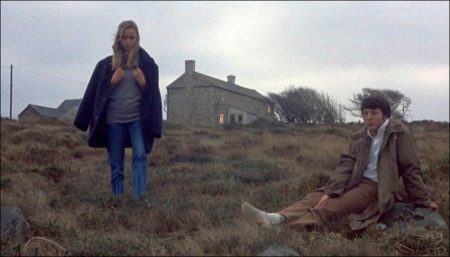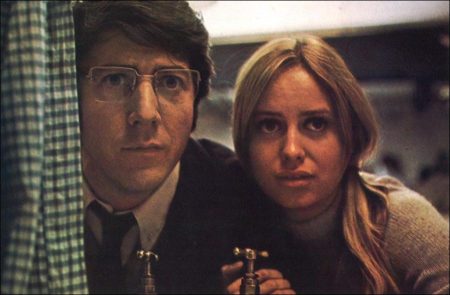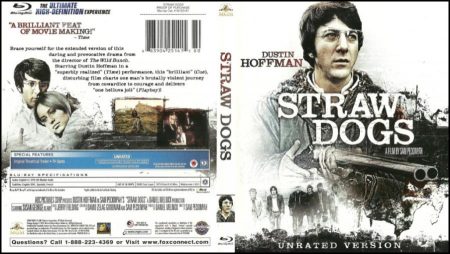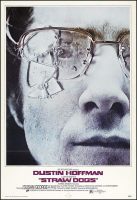Taglines: How far will a man go to protect his wife and his home?
Straw Dogs movie storyline. David Sumner (Dustin Hoffman) and his wife Amy (Susan George) decide to settle in the town where Amy was born and raised, escaping the chaos and increasing social violence in the city. But the violence they flee will find them unexpectedly in this small English town.
The four workers they hire to build a garage in their new home are led by Charlie, Amy’s boyfriend years ago. But before long, this group becomes trouble for the young couple. They make fun of David and make fun of Amy. Even if David tries to deal with the events in a very calm manner and even to make himself accepted among them, he cannot prevent the terrible events.
Straw Dogs is a 1971 psychological thriller film directed by Sam Peckinpah and starring Dustin Hoffman and Susan George. The screenplay, by Peckinpah and David Zelag Goodman, is lightly based upon Gordon M. Williams’s 1969 novel, The Siege of Trencher’s Farm. The film’s title derives from a discussion in the Tao Te Ching that likens people to the ancient Chinese ceremonial straw dog, being of ceremonial worth, but afterwards discarded with indifference.
The film is noted for its violent concluding sequences and a complicated rape scene. Released theatrically in the same year as A Clockwork Orange, The French Connection, and Dirty Harry, the film sparked heated controversy over a perceived increase of violence in films generally.
The film premiered in the U.K. in November 1971. Although controversial at the time, Straw Dogs is considered by some critics to be one of Peckinpah’s greatest films. A remake directed by Rod Lurie and starring James Marsden and Kate Bosworth was released on September 16, 2011.
Film Review for Straw Dogs
Sam Peckinpah, director of Straw Dogs, is known as “Bloody Sam sebebiyle because he committed violence in the cinema and was not a coward. The director’s film Straw Dogs, on the other hand, is banned and censored for years with the scenes of violence and rape. Twenty-seven years after Sam Peckinpah’s death in 1984, the film was freed and he was allowed to screen as he was filmed.
What is the reason why the film has been banned for years? Before explaining that issue, let’s give a rough overview of the subject: David (Dustin Hoffman) and his wife Amy (Susan George) decide to settle in the town where Amy was born and raised (England) in the United States, escaping from the chaos and increasing social violence.
But the violence they flee will find them in an unexpected way. For those who do not watch, I don’t want to spoil the viewing pleasure by giving more information about the subject of the film and miss the magic of the film, but the film is a remarkable production that should be watched in terms of showing how even a very calm person can get out of hand.
Now the reason why the film was banned for years: The film was banned because of the violence and rape scenes it contained. I seem to hear you say, “What’s in this?” But the fact that director Peckinpah has been portrayed as a misogynist for years because of his attitude in the rape scenes and the character of Amy who has been raped also likes to rape, made the film not getting permission for many years.
Even though you don’t like what you see and you are forced to watch it thanks to the increasing dose of violence every minute in Straw Dogs, it is a production you will watch until the last minute. Dustin Hoffman’s acting is the biggest factor in this. Also, Sam Peckinpah prepares the audience so well for the film’s finale that the audience will not be disturbed by the increasing violence. There is a good reason for the increase in violence.
Straw Dogs (1971)
Directed by: Sam Peckinpah
Starring: Dustin Hoffman, Susan George, Peter Vaughan, T.P. McKenna, Del Henney, Jim Norton, Donald Webster, Ken Hutchison, Sally Thomsett, Cherina Schaer, Colin Welland
Screenplay by: David Zelag Goodman, Sam Peckinpah
Production Design by: Ray Simm
Cinematography by: John Coquillon
Film Editing by: Paul Davies, Tony Lawson, Roger Spottiswoode
Art Direction by: Ken Bridgeman
Music by: Jerry Fielding
MPAA Rating: R for strong brutal violence including a sexual attack, menace, some sexual content, and pervasive language.
Distributed by: Cinerama Releasing Corporation (US and UK), 20th Century Fox (International)
Release Date: December 22, 1971 (Los Angeles)
Views: 1426



